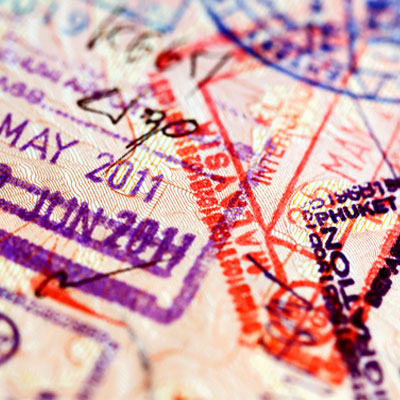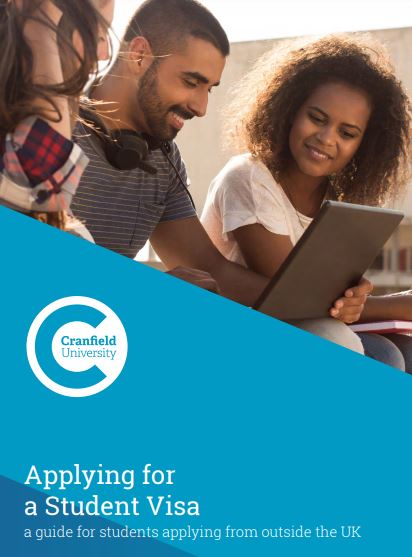Cranfield offers advice and guidance to international students who require a visa to study in the UK.
If you require a visa in order to study at Cranfield University, the Student Immigration Team can offer support and advise in the following areas:
- Student visa;
- PBS (Student) Dependant;
- Studying at Cranfield with a visitor visa;
- Academic Technology Approval Scheme (ATAS);
- CAS numbers;
- Other visa categories on which you can study.
Students coming to Cranfield to study one of our full-time taught courses, and some part-time research degrees, will need to apply for a Student visa. Students coming to Cranfield to study one of our short courses and most of our part-time courses will need to apply for a visitor visa.
Please read the following information carefully, and if you have any questions regarding immigration please email us.
Student visa
We offer advice and guidance on how to apply for the Student visa from both inside and outside the UK. We can also help with the following visas:
- Schengen visa;
- Studying at Cranfield on a visitor visa;
- Skilled Worker Route (formerly Tier 2 visa);
Studying at Cranfield with a visitor visa
Students can undertake study at Cranfield on a visitor visa in the below circumstances
- If you are studying a short course of study for 6 months or less
- If you are undertaking a period of research as a visiting researcher for 6 months or less
- If you are studying a part-time course of study that is longer than 6 months and meets the definition of a distance learning course. For visa purposes a distance learning course is one where you do less than 56 days of study on-campus in the UK in any 6 month period.
If your study is one of the above options then instead of receiving a CAS and applying for a student visa then you will instead apply for a visitor visa or if you are a non-visa national you receive one when you arrive to the UK. If you are unclear on the visa type that is appropriate for your study at Cranfield please contact the Student Immigration team – studentimmigration@cranfield.ac.uk.
A visitor visa duration is normally a period of six months. However, a 'Standard visitor' can also apply for a visit visa with a two, five or ten year validity period. Whilst such visas will allow for multiple entry, the maximum duration of each visit will be restricted to six months.
You do not need to apply for a visitor visa before travelling if you are a non-visa national (check whether the country you are a citizen of appears on the visa national list), you can apply to enter the UK as a visitor on arrival at the port of entry unless you have previously been in breach of immigration law or have criminal record/s.
If you do not apply for a visitor visa before you travel, you will need to produce all the documents to support your application to enter the UK as a visitor to the Border Force Officer when you arrive at the port of entry to the UK. This includes evidence of the study that you wish to do in the UK as a visitor, an ATAS certificate if applicable and evidence of your finances in order to satisfy the genuineness requirement.
If you are a visa national then you must apply for entry clearance as a visitor before you travel to the UK. You have to fill the application in and pay for it online and submit the relevant supporting documents, including:
- A valid travel document;
- Evidence that you have enough money to support yourself while you are in the UK. You need to show that you can pay for any applicable tuition fees, accommodation and living expenses. There are no specific requirements which state the amount of money you must show when you apply for a visitor visa. However you must show that you have enough money to cover your course fees plus accommodation and living expenses. Using the Student maintenance figures as a guide only, it would be reasonable to show that you have the equivalent of £1,023 per month for the duration of your studies. If you will be staying with friends or family while in the UK, which will decrease your living costs, you can include evidence of this;
- Evidence of the study you will be undertaking and your acceptance onto this course;
- ATAS certificate if this is a requirement for your course;
- All other supporting documents as applicable as outlined in the Home Office's website on supporting documents for visitor applications to the UK. You will also need to provide a translation of any documents which are not already in English.
When to apply for visitor visa: Within 3 months from course start/attendance date
Graduate visa
The Graduate route visa is a new two-year (three year for PhD students) work visa. Students holding a valid Tier 4 or Student visa, who have completed a degree at undergraduate level or above at a UK Higher Education Provider with a track record of compliance, are able to apply to remain in the UK and work or look for work.
IMPORTANT: Please do not submit an application until you meet all the eligibility criteria below otherwise you risk a visa refusal and/or losing your application fee.
Eligibility
- Must be on a Tier 4 or Student visa.
- Must apply from within the UK before your Tier 4/Student visa expires. It is not possible to apply for the Graduate visa outside the UK.
- You will need the CAS number that you used for your most recent Tier 4/Student visa application.
You must obtain 70 points in total. The areas that points will be awarded for are:
- Successful completion requirement,
- Qualification requirement,
- Study in the UK requirement.
There are also certain requirements to be met for the application to be valid (accepted). The following sections provide further information:
- Successful completion requirement
- You must have successfully completed the course you studied on your most recent student visa.
- The University will need to confirm your course has been successfully completed by the date of application. The University aims to report all successful completion to UKVI within 2 weeks of you receiving your pass letter
- Qualification requirement
- This requirement will be met as long as you have successfully completed a course for which you have been or will be awarded, such as a master’s degree, MPhil or PhD. PGCert and PGDip awards are not currently eligible under the Graduate route.
- If the course title changed but the course content remained unchanged you could still meet this requirement.
- The qualification must have been obtained in the last grant of Student permission.
- If you hold Student permission (visa) to cover a Student Union Sabbatical Officer position, the course must have been successfully completed within the last grant of student permission to study as a student. Please contact us if you have had 2 periods of student sabbatical leave.
- Study in the UK requirement
- You must have studied in the UK for a certain minimum period of the course:
| Course duration | Minimum period of study required |
|---|---|
| Less than 12 months | Full duration of course |
| More than 12 months | Minimum 12 months |
Finances
There is no financial requirement for the Graduate route. Unlike other visas, you will not need to keep a certain amount of money in your bank account or submit bank statements with your visa application.
You will need to make the following payments at the point of application by debit or credit card:
- Application fee: £822
- Immigration Health Surcharge: £1,035 per year. Master’s graduates will pay £2,070 for a 2-year visa, PhD graduate will pay £3,105 for a 3-year visa.
When to apply
You should submit a visa application after you have been awarded and meet all the eligibility criteria but before your Student/Tier 4 visa expires.
Your degree must have been awarded and confirmed to UKVI by the University. The University aims to report all successful completion to UKVI within 2 weeks of you receiving your pass letter. Pass letters are usually processed within 2-3 weeks after the exam board date.
If you have any outstanding assessments after your course end date has passed, you will have to bear in mind an estimated award date. If this is after your visa expiry date, this may affect your Graduate visa eligibility.
For further information about the Graduate route visa please see the UKVI and UKCISA websites.
Cranfield University is implementing a range of activities to enable its graduates to take advantage of Government proposals to allow international students to work in the UK after graduation.
Meet the Student Immigration Team
 |
Jo Ashpole Student Immigration and Compliance Manager |
 |
Lucy Chappell Student Immigration Advisor |

